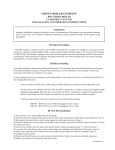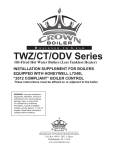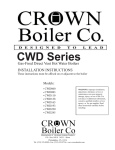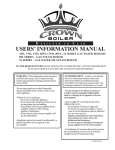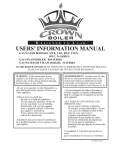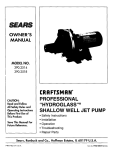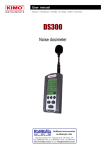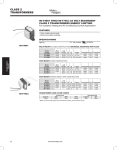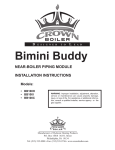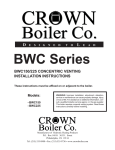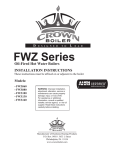Download Crown Boiler BWF195 Instruction manual
Transcript
D E S I G N E D T O L E A D BWF/CWD Series Gas-Fired Induced Draft Hot Water Boilers Installation Supplement for boilers equipped with honeywell s9361A “integrated boiler control” These instructions must be affixed on or adjacent to the boiler Warning: Improper installation, adjustment, alteration, service or maintenance can cause property damage, injury, or loss of life. For assistance or additional information, consult a qualified installer, service agency or the gas supplier. Read these instructions carefully before installing. Manufacturer of Hydronic Heating Products P.O. Box 14818 3633 I. Street Philadelphia, PA 19134 www.crownboiler.com 2 I Basic Information A. What is this Supplement For? This instruction manual supplement provides important information on the installation and operation of BWF and CWD boilers equipped with a S9361A control like that shown in Figure 1.0 below. The S9361A is being used in place of the control system described in the manual supplied with this boiler in order to comply with the 2007 Energy Independence and Security Act (EISA). The S9361A-based system saves energy using a “thermal purge” feature which first attempts to satisfy a heating demand by using residual heat in the boiler before allowing the burners to fire. In addition, this control system offers the following new features: • • • Ability to operate two circulator zones without additional controls. Optional 24 volt low water cut-off kit #761000 that plugs directly into this control system LED readout of boiler status B. How to use this Supplement All information and Warnings in the original manual still apply EXCEPT for the following: a) Information in this manual completely replaces Section IX (“Wiring”) in the original manual b) Section Xb (“Operation”) in this manual includes information for reading and adjusting the S9361A which is completely new. c) Information in this manual completely replaces Section XII (“Troubleshooting”) in the original manual d) Section XIII (“Parts”) in this manual provides a list of replacement parts that are unique to the S9361A-based system. INSTALL AND SERVICE THE BOILER IN ACCORDANCE WITH THE ORIGINAL INSTRUCTIONS EXCEPT FOR THOSE SECTIONS LISTED ABOVE. FIGURE 1.0: S9361A CONTROL 1 Section IX Wiring WARNING • All wiring and grounding must be done in accordance with the authority having jurisdiction or, in the absence of such requirements, with the National Electrical Code (ANSI/NFPA 70). • Disconnect electrical power to the boiler and heating system before servicing. Positively assure that no voltage is present. Lock electrical boxes to prevent someone from inadvertently restoring power before the heating system is safe to operate. • Never defeat or jump out safety devices. • Protect each boiler circuit with a properly sized over-current protection device. • Make electrical connections carefully according to the boiler’s wiring diagram and instructions. • Wire additional field supplied safety limits, such as low water cutoffs and temperature limit devices, in series with the 120v circuit used to power the boiler. Do not alter the boiler’s factory wiring when adding an additional limit device. 1) Line Voltage (120 VAC) Field Connections – See Figure 9.0 for line voltage connections. Provide a dedicated circuit for the boiler of 15A or greater. A service switch is recommended and is required by many local codes. Locate this switch in accordance with local codes or, in the absence of any, in a location where it can be safely accessed in an emergency involving the boiler. All 120VAC connections to the boiler itself are made inside the junction box on the right side of the boiler. 120VAC connections are: • • • • • • • Ground 120VAC Hot (Black) 120VAC Neutral (White) Heating Circulator Hot (Red) Heating Circulator Neutral (White) DHW Circulator Hot (Blue) DHW Circulator Neutral (White) The use of the Circulator outputs are as follows (also refer to the Piping Section) a) Heating Circulator - Pumps water upon a call for heat (CH) from a heating thermostat connected to the leads shown in Figure 9.1 or from an EnviraCom thermostat. b) DHW Circulator - Pumps boiler water to an indirect water heater upon a call for domestic hot water (DHW) from the DHW thermostat terminals shown in Figure 9.1. This output can also be used for a second space heating zone. See Section Xb of this manual for additional information. Maximum circulator current draw is 5.0 FLA. 2) Low Voltage Connections – Low voltage field connections are located as shown in Figure 9.1 and are as follows: a) Heating Thermostat - Connect to a 24 volt thermostat or other “dry contacts” (such as a zone panel end switch) that close upon a call for heat. Follow thermostat manufacturer’s instructions. To insure proper thermostat operation, avoid installation in areas of poor air circulation, hot spots (near any heat source or in direct sunlight), cold spots (outside walls, walls adjacent to unheated areas, locations subject to drafts). Provide Class II circuit between thermostat (or zone controls) and boiler. b) DHW - If used, connect to a 24VAC domestic hot water thermostat or 2nd space heating thermostat. 2 c) Option Plug - Used to connect Crown #761000 optional LWCO kit. If this kit is not installed, the factory supplied jumper plug shown in Figure 9.1 must be installed for boiler to operate. d) EnviraCOM - Used to connect EnviraCom thermostat or other EnviraCom device approved by Crown for use with this boiler. CAUTION • • • When making low voltage connections, make sure that no external power source is present in the thermostat circuits. If such a power source is present, it could destroy the boiler’s control. One example of an external power source that could be inadvertently connected to the low voltage connections is a transformer in old thermostat wiring. Do not attempt to use EnviraCOM connections for any purpose not explicitly permitted by Crown Boiler Company. Attempting to do so may result in unreliable operation and/or damage to controls. Do not use the transformer provided on the boiler to power external devices such as zone valves. Doing so may cause damage to the transformer. FIGURE 9.0: LINE VOLTAGE CONNECTIONS FIGURE 9.1: LOW VOLTAGE CONNECTIONS 3 FIGURE 9.2: INTERNAL CONNECTIONS DIAGRAM 4 FIGURE 9.3: LADDER DIAGRAM 5 Xb Operation A. General Information This boiler uses a proprietary version of the Honeywell S9361A “integrated boiler control” to manage all boiler functions including flame supervision, temperature control, and circulator operation. This control can operate one or two circulator zones without the use of additional relays. In accordance with the 2007 Energy and Independence Security Act, this control first attempts to use residual heat in the boiler to satisfy a space heating demand before firing the burner. In this manual, this function is referred to as a “thermal purge”. For additional information see Part C of this section. B. Reading Status and Using Menu The boiler’s status, as well as all parameters, are viewed and adjusted using the 3 digit LED and three buttons shown in Figure 10b.0. The S9361A has four basic modes of operation (also see Figure 10b.1): 1) Status Mode - This is the default mode of operation for the control. In it, the display alternates between StA and a number indicating the current status of the boiler. A list and description of these status numbers is shown in Table 10b.2 and is also shown on the face of the control itself. 2) Operating Mode - Provides additional information about the current status of the boiler. Operating mode is entered by pressing the I button shown in Figure 10b.0. When this button is first pressed in Status mode, the display will alternately display bt and the current boiler water temperature as shown in Figure 10b.3. Pressing the I button again will display the next line item shown in Table 10b.2. In the same manner it is possible to advance through all of the “parameters” shown in Table 10b.2. To return to Status mode, press I repeatedly until StA once again appears on the display. Alternatively, the control will return to Status mode if no key is touched for 30 minutes. 3) Error Mode - In Error mode, the control alternately displays Err and an error code. A list of these error codes is found on the front of the control, as well as in Section XII of this manual (along with suggested corrective actions). 4) Adjustment Mode - Used to change parameters, such as high limit setting. See Part C for using Adjustment Mode. Figure 10b.0: Location/Appearance of LED, Buttons 6 FIGURE 10b.1: BOILER CONTROL MENU STATUS MODE: 6W$=Current Status (Table 10b.2) Press I to enter OPERATING MODE Press and Hold I, ↑, and ↓ for at least 3 sec to enter ADJUSTMENT MODE EW= Current Boiler Temp. +/= High Limit Setting 63= Current Set Point +G) = Limit Differential +/= High Limit Setting 2U=Circulator Overrun +G) = Limit Differential 33=Thermal Purge Time WW=Call for Heat? (On/Off) 6W=Thermal Purge Temp GK=Call for DHW? (On/Off) 3W=DHW Priority (ON/OFF) )/$=Flame Signal (uA) GK=Use of 2nd Zone UXQ=Total Run Time (hrs) UVW=Reset &\&=total burner Cycles )&=Temperature Units E$F=Return to Status Mode N Boiler in Lockout? Press I Press ↑ or ↓ Y Y ERROR MODE (Visible when Lockout is Present) (UU = Code for Error Present (Table 13.0) Except as shown above, press I to navigate through menu. Use ↑,↓ to change parameters in Adjustment Mode 7 Boiler in Lockout? N TABLE 10b.2: STATUS CODES Status # 1 2 3 Description Meaning Standby No call for heat or DHW OR Call for heat present , but boiler is in thermal purge (See PP on page 10) OR Call for heat/DHW present but boiler temperature is above high limit (HL) setting. Waiting for Pressure Switch to open Waiting for Pressure Switch to close Control is confirming that air pressure switch contacts are open before starting fan. Fan is on and control is waiting for air pressure switch contacts to close. Prepurge Pressure switch is closed and control is waiting 30s before starting trial for ignition. Spark Control is attempting to light pilot Flame proving Control is verifying that the pilot flame is on and stable. Running Main burner is on 10 Retry/Recycle Delay Control was unable to establish pilot and is waiting 60 seconds before trying again OR Proof of pilot was lost after pilot was established and control is waiting 60 seconds before attempting to relight. 11 Pressure Switch failed to open. Control waited in Status #2 for 60 seconds and air pressure switch remained closed. Boiler will remain in this state until the air pressure switch opens. 12 Pressure Switch failed to close. Control waited in Status #3 for 60 seconds and air pressure switch failed to close. Boiler will remain in this state until the air pressure switch closes. 13 Soft Lockout A fault is preventing the boiler from firing. Boiler will be allowed to fire after problem clears itself AND a forced delay period has passed. 14 Hard Lockout A fault has occurred which requires manual intervention before the boiler will again operate. This intervention can be in the form of interruption of the power supply to the boiler or resetting the control in Adjustment mode. 15 Waiting for limit to close LWCO open (if LWCO kit PN 761000 installed), limit jumper plug missing, or flame rollout switch open (BWF series only) 16 Flame Present out of Sequence A flame was detected when none should have been present. 17 Self test Boiler was just energized and control is running a self check. 4 6 7 8 1 sec. 1 sec. 1 sec. FIGURE 10b.3: TYPICAL OPERATING MODE DISPLAY (BOILER TEMP SHOWN) NOTE In operating mode, holding either the ↑ or ↓ button while viewing a given parameter will keep the display on the actual reading. For example, pressing ↑ while reading boiler temperature as shown in Figure 10b.3 will keep the display on 180 for as long as the button is held. This makes it easier to view readings “live” if they are changing rapidly 8 TABLE 10b.4: OPERATING MODE PARAMETERS Parameter # bt SP HL HdF Description Meaning Boiler Temperature Current boiler water temperature measured by the control’s sensor. Current target temperature (always the same as the high limit setting unless Crown outdoor reset card option is installed). Boiler will stop firing if boiler water temperature exceeds this value (Circulator/s High Limit Set point will continue to operate) If high limit setting is reached, boiler water temperature will need to drop by this High Limit Differential amount before boiler will again fire during the same call for heat. Boiler water set point Heat Request Status Shown as either ON or OFF. Indicates whether there is a call for heat. DHW Request Status Shown as either ON or OFF. Indicates whether there is a call for domestic hot water (DHW). Note that if the dh zone on the S9361A is used as a second heating zone (see Table 10b.5), this parameter will be shown as OFF and tt will be shown as ON when this zone calls for heat. FLA Flame Current Flame rectification signal (uA) run Run Time Hours Total amount of time gas valve has been open (burner firing) since control was new (hours, starting from 1). CyC Boiler Cycles Total number of burner cycles on the control Err Error Number Present only if the control has detected a problem. See Table 13.0 for a list of error codes and suggested corrections. tt dh TABLE 10b.5: ADJUSTMENT MODE PARAMETERS Status # HL dF Or PP St Description Factory Setting High Limit Set point 180F 140-220F High Limit Differential 15F 10-30F Circulator overrun 0 min 0-10 minutes Thermal Purge time 2 min 2-20 minutes* Thermal Purge Start Temp 140F 140-180F Pt DHW Priority ON ON or OFF dh Use of Second Zone dh dh (dhw) or tt2 (2nd heating zone). rst Reset N/A OFF or Momentary ON F-C Temperature Units F F or C bAc Exit Adj. mode N/A N/A Permissible Range * Thermal purge time may be reduced to 0 minutes if Crown outdoor reset card is installed. 9 C. Using Adjustment Mode WARNING Improper adjustments to control parameters could result in unreliable boiler operation, property damage, personal injury, or loss of life. Adjustments should only be made by a qualified heating technician. A list of parameters which can be changed on this control are shown in Table 10b.5. To enter Adjustment mode and change parameters: 1) Press and hold I, ↑, ↓ together for at least 3 seconds. 2) Use I to advance to the parameter which is to be changed. 3) Use the ↑ or ↓ buttons to change the setting or select from possible choices. See below for additional information on the use of these parameters. 4) If other parameters are to be changed, use the I button to advance to the next parameter needing adjustment and change it in the same way. 5) After all parameters have been changed, use the I button to advance until bAc is shown on the display. 6) Press either the ↑ or ↓ key to return to Status mode. Alternatively, the control will return to Status mode if no key is touched for 5 minutes. HL (High limit Set point) - Burners shut down if the boiler water temperature exceeds this setting. The circulator will continue to run. Unless the Crown outdoor reset card is installed, the high limit setting also serves as the water temperature set point (SP) during calls for both heat and DHW. dF (High limit differential) - If the boiler shuts off on high limit, the water temperature must fall by an amount equal to the differential during the same call for heat before the burners will again start. For example, with HL=180 and dF=15, the burners will shut off if the water temperature exceeds 180F and stay off until the temperature falls to 165F (180 - 15). Note that if all calls for heat end while the burners are off on high limit, the burner will not restart during the next call for heat until the thermal purge requirements described below are met. Or (Circulator Overrun) - Determines how long the Heating Circulator will operate after the call for heat ends. In some cases, this can help reduce energy consumption by sending heat stored in the boiler out into the system. At the same time, caution should be exercised before setting this value to something other than zero. Before doing so, verify that the system will permit flow (e.g. flow is not completely cut-off by closed zone valves) and that the overrun will not cause overheating problems. Circulator overrun is only possible on the heating zone. The DHW Circulator will not over-run, even if the DHW zone is used as a second heating zone. PP (Thermal Purge Time) - Upon a call for heat, the boiler will prevent burner operation until either: • • The water temperature drops below the Thermal Purge start temperature (St) OR: The thermal purge time has passed For some examples of this operation, see Table 10b.6. If the “DHW” zone is used for space heating (dh=tt2), this thermal purge function will also keep the burner off at the beginning of a call from the thermostat connected to the “DHW” terminals in the manner described above. If the “DHW” zone is being used for DHW (dh=dh), the burners will immediately come on upon a call for DHW as long as the water temperature is below the high limit setting. Thermal purge is only invoked when a call for heat first appears and the boiler is not already firing. For this reason, if the boiler is already firing in response to an call for heat, and a call for heat appears at the second zone, the boiler will continue to fire. St (Thermal Purge Start Temperature) - See description for Thermal Purge Time above. 10 Table 10b.6: Examples of Thermal Purge Operation Thermal Purge Settings Boiler Temp at Start Temp Begin Time (Pt) (St) Call Boiler Behavior Example # Call for Heat From Use of DHW Zone 1 T-T N/A 2 min. 140F 130 2 T-T N/A 2 min. 140F 150 3 DHW DHW (dh=dh) 2 min. 140F 150 4 Heat T’stat on DHW Heat (dh=tt2) terminals 2 min. 140F 150 • • • • 2 minutes have passed OR Temperature falls below 140 • • DHW Circulator starts immediately Burner fires immediately • “DHW” Circulator starts immediately Burner fires when either: • • 5 T-T N/A 2 min. 145F 150 • • 6 T-T N/A 3 min. 140 150 Heating Circulator starts immediately Burner fires immediately Heating Circulator starts immediately Burner fires when either: • 2 minutes have passed OR Temperature falls below 140 Heating Circulator starts immediately Burner fires when either: 2 minutes have passed OR Temperature falls below 145 Heating Circulator starts immediately Burner fires when either: 3 minutes have passed OR Temperature falls below 140 Pt (DHW Priority) - If this feature is turned on, and simultaneous calls for heat and DHW are present, the heating circulator will be forced off for as long as it takes the boiler to satisfy the call for DHW. This feature is sometimes useful when the boiler size is marginal for the peak DHW demand, but should be used with caution as it can result in lack of heat if the DHW call is very long, or if there is a problem with the DHW zone which causes the DHW demand to be indefinite. Figure 10b.7 describes the behavior of both the Heating and DHW Circulators with Pt turned both ON and OFF. dh (Use of DHW zone) - Although the second zone on the boiler is designated “DHW”, it can be used as a second heating zone by setting dh = “tt2” instead of dh=”dh”. When the “DHW” zone is used for heating, the thermal purge function is active when this zone calls for heat. When dh=tt2, the setting of Pt (DHW priority) is ignored. rst (Reset) - Used to reset the boiler from a hard lockout (as an alternative to momentarily interrupting power to the control). Pressing the up key will turn rst momentarily to on. When it goes back off (typically within one or two seconds), the control is reset. 11 F-C (Temperature Units ) - Determines whether temperature units on the S9361A are displayed in F or C. Note that this selection only applies to the temperature displayed on the LED shown in Figure 10b.0. Temperature units must be selected independently on the displays of any control options plugged into Option Plugs 1 or 2. bAc (Return to Status mode) - Exits adjustment mode. Any changes made to the parameters described above are saved, and become effective, as soon as they are made; bAc only exits adjustment mode. D. Sequence of Operation Table 10b.7: Summary of Circulator Behavior Thermostat Inputs Parameters DHW 2nd Zone Priority (dh) (Pt) Circulator Outputs T-T “DHW” Use of “DHW” Zone ON OFF DHW dh=dh ON ON OFF OFF ON DHW dh=dh ON OFF ON ON ON DHW dh=dh ON OFF ON ON ON DHW dh=dh OFF ON ON ON OFF DHW dh=dh OFF ON OFF OFF ON DHW dh=dh OFF OFF ON ON OFF Heat dh=tt2 ON or OFF ON OFF OFF ON Heat dh=tt2 ON or OFF OFF ON ON ON Heat dh=tt2 ON or OFF ON ON Heating (Red Circ. Lead) “DHW” (Blue Circ. Lead) (Refer to Figures 9.2 or 9.3 for Connection and Ladder diagrams) 1) A call for heat from the thermostat connected to the themostat leads energizes the Heating Circulator (connected to red and white leads in J-box). 2) Depending on the boiler water temperature at the time of the call for heat, the control will do one of two things: • • If the water temperature is below the thermal purge start temperature (St), the control will continue the ignition sequence. If the boiler water temperature is above the thermal purge start temperature, the boiler will wait until either of the following conditions are met before continuing the ignition sequence: a) The boiler water temperature falls below the thermal purge start temperature (St) Factory default is 140F. b) The thermal purge time elapses (PP). Factory default is 2 minutes. 3) If the flame roll-out switch, and LWCO contacts are made, the control will verify that the air pressure switch (APS) is open before starting the fan. 4) The control enegrgizes the fan and waits for the air pressure switch to close. 5) Once the air pressure switch closes, the control waits for a 30s “prepurge period” to pass before attempting to light the pilot. 6) The control starts an ignition spark at the pilot and applies 24 volts across the pilot valve (terminals PV and MV/PV on the gas valve). 7) Once the pilot is established, the pilot flame will act as a diode, converting the AC current at the electrode to a half wave DC current at the pilot’s ground strap. This DC current flows through the boiler to the ground connection on the S9361A. For the ignition module to recognize that a pilot flame is present, the DC current flowing into this terminal must be in excess of approximately 1.0 uA. 8) If the pilot is not proven within 60 seconds of the beginning of the trial for ignition, the pilot valve will close and wait 5 minutes before the ignition sequence is retried. 9) Once the ignition module detects the presence of a pilot flame, voltage is applied across the main valve (terminals MV and MV/PV on the valve), opening the valve and establishing main flame. 10) If the water temperature climbs above the high limit setting during the call for heat, the burner and blower will shut down 12 while the Heating Circulator continues to operate. The ignition sequence will restart (from Step 3) when the water temperature falls to the high limit setting (HL) minus the high limit differential (HdF). 11) A call for DHW results in a sequence of operation that is identical to that described above except for omission of the thermal purge function described in (2). E. Safety Control Operation Air Pressure Switch (APS) - The APS proves that the fan is running before allowing the igniton sequence to proceed. Failure of this switch to close is usually the result of a problem with the vent system, such as a blockage, or a problem witgh the fan. If this switch must be replaced, it must be replaced with an identical switch or one that is shown in Crown documentation as being a suitable repelacement for this boiler (see Parts Section of boiler installation manual). Flame Roll-out Switch (BWF series only) - Automatically interrupts boiler operation when flames or excessive heat are present in vestibule. The flame roll-out switch is a single use device which must be replaced by an identical switch in order to restore normal operation. An open flame roll-out switch is usually indicative of a plugged heat exchanger. The cause of the flame roll-out must be found and corrected by a qualified gas service technician, and the switch replaced with an identical one, before the boiler is returned to operation. 13 XIII Troubleshooting A. Before Troubleshooting The following pages contain trouble shooting tables for use in diagnosing control problems. When using these tables the following should be kept in mind: 1) This information is only meant to be used by a professional heating technician as an aid in diagnosing boiler problems. 2) Where applicable, follow all precautions outlined in the Section X (Start-up and Checkout) of the boiler installation manual. 3) In general, these tables assume that there are no loose or miswired electrical connections. Before using these tables inspect all electrical connections on the boiler to make sure that they are tight. Also, check the wiring on the boiler against the wiring diagram in Figures 9.2 and 9.3. Ensure that incoming 120 VAC power polarity is correct and that the boiler is properly grounded. Further, ensure that the control power supply is 24 VAC (minimum 18 VAC to maximum 30 VAC). 4) All controls on the boiler are tested at least once in the manufacturing process and a defective control or component is generally the least likely cause. Before replacing a component, try to rule out all other possible causes. 5) When checking voltage across at wiring connectors be careful not to insert the meter probes into the metal sockets. Doing so may damage the socket, resulting in a loose connection when the harness is reconnected. B. If Display is Blank 1) Check for 24 VAC on transformer secondary connections (screws to which blue and yellow leads are connected). If voltage across these screws is between 18 and 30 VAC, possible causes include: • • • Loose connection at either plug or transformer end of transformer harness (blue/yellow harness). Defective transformer harness Defective boiler control 2) If voltage is less than 18VAC at transfer secondary, possible causes include: • • • • • Service switch off Trip 120VAC breaker Miswired or loose connection in 120VAC boiler circuit. Loose connection inside J-box between transformer primary and 120VAC line. Defective transformer (possibly caused by short circuit in 24VAC wiring or additional loads connected to the transformer in the field). C. If Control Shows Err Code Use Table 13.0 to help identify and correct the cause of the problem. D. If Control Shows StA Code, but Other Problem Present If no Err Code is observed (even after repeatedly pressing I to cycle through Operation Mode), use Table 13.1 to help identify and correct the cause of the problem. 14 Table 13.0: Error Codes Error Code Meaning 2 Pressure Switch failed to open 4 Low Flame Signal 6 Pilot Flame detected when no flame should be present 18 23 29 32 Internal electronics failure Possible Cause • • • • • • • • • • • • • • • Flame sensed during 30s pre• purge (before pilot valve opened) • • • Air pressure switch failed to close • • • Boiler water temperature sensor • failure • 35 Duplicate Zone 57 Grounded pilot electrode 58 AC Power Frequency Error 59 Line voltage error (Supply voltage too high or low) 60 Thermostat input higher than threshold 61 Line Voltage Unstable 63 Maximum recycles exceeded 64 Internal failure 89 EnviraCom communication lost Jumped air pressure switch Condensate in air pressure switch or switch tubing Defective air pressure switch Low gas pressure at gas valve inlet Partially plugged pilot tubing or pilot orifice Loose connection in ignition cable or ground wiring Dirty pilot electrode/ground strap Pilot electrode porcelain cracked Damaged pilot hood/ assembly Defective control Defective gas valve High gas pressure Defective control Possible internal problem with boiler control. Cycle power to the boiler and replace control if problem persists. Defective gas valve High gas pressure Defective control Vent system blockage Vent system not constructed in accordance with installation manual (excessive length, undersized pipe, wrong terminal, etc) Condensate or leakage in air pressure switch tubing Winds in excess of 40mph Loose sensor connection at control Defective Sensor Defective control Error code reserved for future use • • • • • • • • • • • • • • Condensate or foreign material is shorting pilot electrode to ground. Ignition cable insulation is damaged and touching ground. Pilot is damaged 120VAC power supply frequency is incorrect (Should be 60Hz) 120VAC power supply is dirty (consult electrician and/or Utility) Boiler water temperature sensor common (center wire) is damaged and shorted to ground Power supply voltage is incorrect (should be 120VAC nominal) Defective or incorrect 24VAC transformer Loose 120VAC connection or 24VAC connection between transformer and control External voltage is applied to thermostat connections (most common cause is external transformer in old thermostat wiring. 120VAC power supply is dirty (consult electrician and/or Utility) Loose 120VAC connection or 24VAC connection between transformer and control Large electrical loads elsewhere on the installation are switching on and off, causing incoming voltage to swing excessively at boiler. See Error Code 4 above (boiler lost proof of pilot 6 times in a row) • Improper pilot operation • If problem persists, replace control Should not be observed on BWF or CWD Series Boilers. 15 Table 13.1: Faults without Error Code Present Displayed Codes Problem Possible Cause Burners and Circulator Off • • • • Thermostat/s not calling for heat Loose connection in thermostat, zone valve end switch, or zone panel wiring. Thermostat, zone valve, or zone panel miswired Defective thermostat, zone valve, or zone panel StA 1 tt On Burners Off Circulator On Boiler Warm • • Boiler off on high limit (normal operation) Boiler off on thermal purge (normal operation - See Table 10b.6) tt On Heating Circulator Off • Heating Circulator is being forced off on DHW priority (normal operation if Pt=ON see Table 10b.7). See causes for “DHW Circulator off “ below Loose connection in circulator wiring Defective circulator Circulator is running, but system problem is preventing circulation Limit or LWCO connected to Option Plug is open. No option is connected at the Option Plug and jumper plug (PN 9601830 ) is missing. Flame roll-out switch (FRS) open due to blocked heat exchanger. Correct problem and replace FRS with exact replacement (see parts list) Loose connection in ignition cable or pilot ground Damaged electrode porcelain or ignition wire insulation (replace pilot) Pilot electrode or Ground strap damaged (replace pilot) If you cannot hear spark at all, replace control Low inlet gas pressure Plugged, kinked, or leaking pilot tubing Plugged pilot orifice Gas line not purged of air Defective pilot assembly Defective gas valve (before replacing, confirm that there is 24VAC between PV and MV/PV. If there is not, control harness is loose or the control itself is defective). Loose connection in harness between control and gas valve. Low inlet gas pressure Partially plugged, kinked, or leaking pilot tubing Partially plugged pilot orifice Loose connection in ignition cable or pilot ground Damaged electrode porcelain or ignition wire insulation (replace pilot) Pilot electrode or Ground strap damaged (replace pilot) Defective Control StA 1 tt OFF dh OFF dh On StA 15 • • DHW • Circulator Off • • Burners Off • and Fan is Off. • StA 6 No spark at pilot StA 6 Spark, but no pilot flame StA 6 STA 8 StA 10 Pilot flame present, but spark does not shut off Pilot flame present, spark off, but Main Burner does not light at all Main burner lights, but shuts off immediately StA 10 No spark or or StA 13 pilot • • • • • • • • • • • • • • • • • • • • Loose connection in harness between control and gas valve Defective gas valve (before replacing, confirm that there is 24VAC between MV and MV/PV. If there is not either there is a loose connection in the control harness or the control itself is defective). • • • Low inlet gas pressure Partially plugged, kinked, or leaking pilot tubing Partially plugged pilot orifice • Pilot was either never established or proof of pilot was lost after it was lit. Cycle power to the boiler and look for symptoms above. 16 XIII PARTS The following parts may be obtained from any Crown distributor. To find the closest Crown distributor, consult the area Crown representative or the factory at: Crown Boiler Co. Customer Service P.O. Box 14818 Philadelphia Pa. 19134 www.crownboiler.com Consult installation manual supplied with the boiler for a complete list of boiler parts. 17 PARTS UNIQUE TO BWF SERIES BOILERS EQUIPPED WITH S9361A CONTROL SYSTEM QUANTITY PER BOILER OR CROWN PART NUMBER QTY. OR CROWN PN BWF061 BWF095 BWF128 BWF162 BWF195 BWF229 INTEGRATED BOILER CONTROL (INDUCED DRAFT) (HONEYWELL S9361A2077) 3505065 1 EA 1 EA 1 EA 1 EA 1 EA 1 EA TRANSFORMER (HONEYWELL AT72D1006) 35-2100 1 EA 1 EA 1 EA 1 EA 1 EA 1 EA 12” SENSOR (HONEYWELL 50001464-001/B) 350076 1 EA 1 EA 1 EA 1 EA 1 EA 1 EA SENSOR ENCLOSURE 350078 1 EA 1 EA 1 EA 1 EA 1 EA 1 EA SENSOR HARNESS CONNECTOR 9601875 1 EA 1 EA 1 EA 1 EA 1 EA 1 EA SENSOR HARNESS 9601130 1 EA 1 EA 1 EA 1 EA 1 EA 1 EA BOILER CONTROL HARNESS 9601870 1 EA 1 EA 1 EA 1 EA 1 EA 1 EA POWER & CIRCULATOR HARNESS 1 EA 9601841 9601841 9601842 9601842 9601842 9601842 TRANSFORMER HARNESS 1 EA 9601856 9601856 9601857 9601857 9601857 9601857 FAN ADAPTOR HARNESS 9601860 1 EA 1 EA 1 EA 1 EA 1 EA 1 EA LIMIT JUMPER HARNESS 9601830 1 EA 1 EA 1 EA 1 EA 1 EA 1 EA INNER PANEL (KEY # 80) 1 EA 650393 650394 650395 650396 650397 650398 DESCRIPTION PARTS UNIQUE TO CWD SERIES BOILERS EQUIPPED WITH S9361A CONTROL SYSTEM DESCRIPTION QTY. OR CROWN PN CWD060 QUANTITY PER BOILER OR CROWN PART NUMBER CWD083 CWD110 CWD138 CWD165 CWD193 CWD220 CWD245 INTEGRATED BOILER CONTROL (INDUCED DRAFT) (HONEYWELL S9361A2077) 3505065 1 EA 1 EA 1 EA 1 EA 1 EA 1 EA 1 EA 1 EA TRANSFORMER (HONEYWELL AT72D1006) 35-2100 1 EA 1 EA 1 EA 1 EA 1 EA 1 EA 1 EA 1 EA 12” SENSOR (HONEYWELL 50001464-001/B) 350076 1 EA 1 EA 1 EA 1 EA 1 EA 1 EA 1 EA 1 EA SENSOR CLAMP (HONEYWELL) 350077 1 EA 1 EA 1 EA 1 EA 1 EA 1 EA 1 EA 1 EA BOILER CONTROL HARNESS 9601870 1 EA 1 EA 1 EA 1 EA 1 EA 1 EA 1 EA 1 EA POWER & CIRC. HARNESS 1 EA 9601841 9601841 9601842 9601842 9601842 9601842 9601842 9601842 TRANSFORMER HARNESS 1 EA 9601856 9601856 9601857 9601857 9601857 9601857 9601857 9601857 FAN ADAPTOR HARNESS 9601860 1 EA 1 EA 1 EA 1 EA 1 EA 1 EA 1 EA 1 EA LIMIT JUMPER PLUG 9601830 1 EA 1 EA 1 EA 1 EA 1 EA 1 EA 1 EA 1 EA CONTROL PANEL (KEY #88) 620355 1 EA 1 EA 1 EA 1 EA 1 EA 1 EA 1 EA 1 EA 18 19 20 21 Manufacturer of Hydronic Heating Products P.O. Box 14818 3633 I. Street Philadelphia, PA 19134 www.crownboiler.com PN 980650 Rev 0, 6/12
























